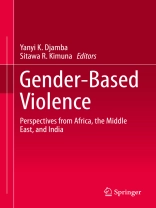This book offers new perspectives on gender-based violence in three regions where the subject has been taboo in everyday discourse often due to patriarchal cultural norms that limit women’s autonomy. The contributions to this book provide rare insight into not only the levels and the socio-demographic determinants of domestic violence, but topics ranging from men’s attitudes toward wife beating; domestic violence-related adolescent deaths, and women’s health problems due to sexual and physical abuse. With a comprehensive introduction that provides a comparative international research framework for discussing gender-based violence in these three unique regions, this volume provides a key basis for understanding gender-based violence on a more global level.
Part I, on Africa, covers men’s attitudes towards domestic violence, the impact of poverty and fertility, the association between adolescent deaths and domestic violence, and the link between domestic abuse and HIV.
Part II, on the Middle East, covers the importance of consanguinity on domestic violence in Egypt and Jordan, the effects of physical abuse on reproductive health, and the link between political unrests and women’s experience and attitudes towards domestic violence.
Part III, on India, shows how sexual abuse puts women at risk of reproductive tract infections and sexually transmitted infections, as well as the role of gender norms in wife abuse and the role of youth aggressive behavior in nonconsensual sex.
With such a deep and broad coverage of factors of intimate partner abuse, this book serves as a reference document for researchers, decision-makers, and organizations that are searching for ways to reduce gender-based domestic violence. This book is of interest for researchers in Criminology and Criminal Justice, as well as Sociology, Social Work, Public Health and Human Rights.
Tabella dei contenuti
Introduction Yanyi K. Djamba and Sitawa R. Kimuna.- Part 1: Gender Based Violence: Perspectives from Africa.- Chapter 1: Socio-Demographic Factors Associated with Men’s Attitudes Toward Wife Beating in Ethiopia Yanyi K. Djamba, Sitawa R. Kimuna and Mosisa G. Aga.- Chapter 2: First Intimate Physical Violence and Fertility in Cameroon Alice Jacqueline Azebaze Kagou and Hélène Kamdem Kamgno.- Chapter 3: Violence Against Young Females in South Africa: An Analysis of the Current Prevalence and Previous Levels of youth Mortality, 1997-2009 Nicole De Wet.- Chapter 4: Exploring the Linkages Between Spousal Violence and HIV in Five Sub-Saharan African Countries Kerry L.D. Mac Quarrie, Rebecca Winter and Sunita Kishor.- Part 2: Gender Based Violence: Perspectives from the Middle East.- Chapter 5: Consanguineous Marriage: Protective or Risk Factor for Intimate Partner violence? Jinan Usta, Marwan Khawaja, Dima Dandachi and Mylene Tewtel.- Chapter 6: Women and Health in Refugee Settings: The Case of Displaced Syrian Women in Lebanon Jinan Usta and Amelia Reese Masterson.- Chapter 7: Gender Dynamics in Palestinian Society: Domestic and Political Violence Sarah Memmi.- Part 3: Gender Based Violence: Perspectives from India.- Chapter 8: Examining Nonconsensual Sex and Risk of Reproductive Tract Infections and Sexually Transmitted Infections Among Young Married Women in India Ajay Kumar Singh, Rabindra Kumar Sinha and Ruchi Jain.- Chapter 9: Questioning Gender Norms to Promote Sexual Reproductive Health Among Early Adolescents: Evidence from a School Program in Mumbai, India Pranita Achyut, Nandita Bhatla and Ravi Verma.- Chapter 10: Transmission of Inter-generational Spousal Violence Against Women in India Aparna Mukherjee.
Circa l’autore
Yanyi K. Djamba is Director of the Center for Demographic Research and Professor of Sociology at Auburn University in Montgomery, Alabama. He received M.A. and Ph.D. degrees in Sociology from Louisiana State University, and was a postdoctoral fellow at the Population Research Center, University of Texas at Austin. Dr. Djamba has previously worked at Brown University and Southeastern Louisiana University, where his last position was Associate Professor and Graduate Program Coordinator. He has received many professional awards and grants from different sources and has served as a consultant to a variety of organizations, as well as the United Nations. Dr. Djamba is the author and co-authors of many publications including Sexual Health of Young People in the U.S. South (2012), Sexual Behavior of Adolescents in Contemporary Sub-Saharan Africa (2004) and numerous peer-reviewed articles and newspaper columns on population related topics.
Sitawa R. Kimuna is Associate Professor of Sociology at East Carolina University. Her research is interdisciplinary and covers substantive areas from gender based violence, social demography, population dynamics and immigration to sexual behavior and HIV in sub-Saharan Africa and socioeconomic support of older people. Dr. Kimuna’s Ph.D. degree in Sociology is from Kansas State University. She was a Population Reference Bureau Communications fellow and a Rockefeller Foundation fellow. She has served also as a consultant to United Nations Fund for Population’s Humanitarian Response Unit. Dr. Kimuna has publications in peer-reviewed journals and also co-edited a book on Women in African Development: The Challenge of Globalization and Liberalization in the 21st Century.












